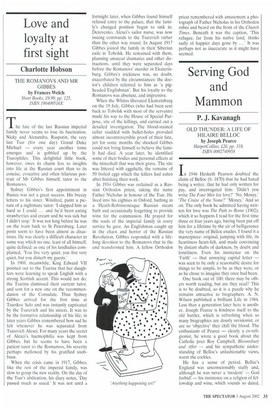Love and loyalty at first sight
Charlotte Hobson
THE ROMANOVS AND MR GIBBES by Frances Welch Short Books, £9.99, pp, 125, ISBN 190409516X The fate of the last Russian imperial family never seems to lose its fascination. Nicky and Alexandra, Rasputin, the very last Tsar (for one day) Grand Duke Michael — every year another tome emerges and is gobbled up by the Tsarophiles. This delightful little book, however, owes its charm less to insights into life at the Russian court than to its concise, evocative and often hilarious portrait of Mr Gibbes himself, tutor to the Romanovs,
Sydney Gibbes's first appointment in Russia was not a great success. His breezy letters to his sister, Winifred, paint a picture of a nightmare tutor: 'I slapped him as hard as I could ... and he'd been eating strawberries and cream and he was sick but I didn't stop.' It was not long before he was on the train back to St Petersburg. Later posts seem to have been almost as disastrous. He was clearly a difficult character in some way which no one, least of all himself, quite defined: as one of his landladies complained, 'You live very quiet, you live very quiet, but you disturb my guests.'
In 1908, meanwhile, King Edward VII pointed out to the Tsarina that her daughters were learning to speak English with a strong Scottish accent. This would not do; the Tsarina dismissed their current tutor, and sent for a new one on the recommendation of the Consulate. Thus Sydney Gibbes arrived for the first time at Tsarskoe Selo and was instantly captivated by the Tsarevich and his sisters. It was to be the formative relationship of his life; in later years Gibbes remembered how sad he felt whenever he was separated from Tsarevich Alexei. For many years the secret of Alexei's haemophilia was kept from Gibbes, but he seems to have been a patient tutor to the Romanovs, his severity perhaps mellowed by his gratified snobbism.
When the crisis came in 1917, Gibbes, like the rest of the imperial family, was slow to grasp the new reality. On the day of the Tsar's abdication, his diary notes, 'Day passed much as usual.' It was not until a
fortnight later, when Gibbes found himself refused entry to the palace, that the family's changed position began to sink in. Derevenko, Alexei's sailor nurse, was now issuing commands to the Tsarevich rather than the other way round. In August 1917 Gibbes joined the family in their Siberian exile in Tobolsk. He remained with them, planning amateur dramatics and other distractions, until they were separated days before the Romanovs' murder in Ekaterinburg. Gibbes's trickiness was, no doubt, exacerbated by the circumstances: the doctor's children referred to him as 'a pigheaded Englishman'. But his loyalty to the Romanovs was absolute, and impressive.
When the Whites liberated Ekaterinburg on the 19 July, Gibbes (who had been sent back to Tobolsk with most of the servants) made his way to the House of Special Purpose, site of the killings, and carried out a detailed investigation. The blood-stained cellar studded with bullet-holes provided almost incontrovertible proof of their fate, yet for some months the shocked Gibbes could not bring himself to believe the family had died. A year later, he identified some of their bodies and personal effects at the mineshaft that was their grave. The site was littered with eggshells, the remains of 50 boiled eggs which the killers had eaten after finishing their work.
In 1934 Gibbes was ordained as a Russian Orthodox priest, taking the name Father Nicholas in honour of the Tsar. He lived into his eighties in Oxford, bathing in a Heath-Robinsonesque Russian steam bath and occasionally forgetting to provide wine for the communion. He prayed for the souls of the imperial family in every service he gave. An Englishman caught up in the chaos and horror of the Russian Revolution, Gibbes responded with a lifelong devotion to the Romanovs that in the end transformed him. A fellow Orthodox priest remembered with amusement a photograph of Father Nicholas in his Orthodox robes and beard on the front of the Church Times. Beneath it was the caption, 'This refugee, far from his native land, thinks sadly of happier days gone by ' It was perhaps not as inaccurate as it might have seemed.


























































 Previous page
Previous page